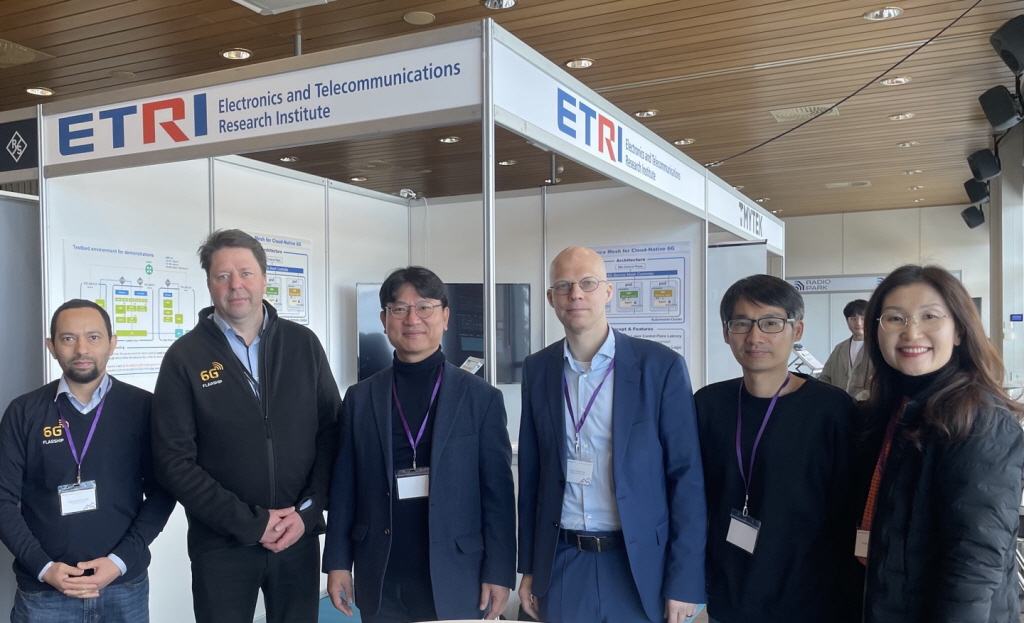한국전자통신연구원(ETRI)이 지난 9일부터 사흘간 핀란드 오울루에서 열린 ‘6G 심포지엄 스프링 2024’ 전시회에서 최신 연구 성과를 공개해 참석자들의 주목을 받았다고 밝혔다.

▲핀란드 6G 심포지엄 스프링 2024 전시회에서 ETRI 연구진과 오울루, 헬싱키 대학교 교수들 모습(좌측에서 세번째, ETRI 고남석 모바일코어네트워크연구실장)
EU 6G 플래그십 프로젝트, 6G 심포지엄 큰 호응
서비스 메시, 기존 네트워킹 절차 80% 이상 줄여
국내 연구진이 차세대 이동통신 기술인 6G 개발을 통해 이동통신 강국으로서 대한민국의 리더십을 세계 시장에서 강화하고 있다.
한국전자통신연구원(ETRI)은 지난 9일부터 사흘간 핀란드 오울루에서 열린 ‘6G 심포지엄 스프링 2024’ 전시회에서 최신 연구 성과를 공개해 참석자들의 주목을 받았다고 밝혔다.
이번 전시회에서 ETRI는 특히 ‘서비스 메시’ 기술을 선보였다.
본 기술은 클라우드 환경에서 동적으로 생성되거나 소멸되는 수많은 가상화된 모바일 네트워크 기능들 사이에서 발생할 수 있는 복잡한 통신 문제를 해결해 주는 6G 핵심 기술이다.
6G 모바일 네트워크는 기존 4G/5G의 전용 하드웨어 장비 구조에서 탈피하고 있다.
모바일 네트워크 기능을 소프트웨어 형태의 서비스로 가상화해 클라우드 환경에서 개발, 배포, 실행, 관리하는 클라우드 네이티브 아키텍처로 발전하고 있다.
이에 따라, 다양한 언어와 환경에서 개발된 마이크로서비스 형태의 네트워크 기능들은 클라우드 상에 배포되어 운영된다.
사용자에게 모바일 서비스를 원활하게 제공하려면 이러한 마이크로서비스들이 복잡한 제어신호를 빠른 속도로 주고받아야 한다.
반면에 기존의 구조에서는 비효율적 통신 방식으로 통신 지연 등의 문제가 있었다.
ETRI가 개발한 새로운 서비스 메시 구조는 기존 네트워킹 절차를 80% 이상 줄여 통신 지연 문제를 대폭 개선했다.
왕복 24회에 걸쳤던 네트워킹 스택 경유 수를 단 4회로 줄였다.
기존 네트워크 기능 내에 혼재해 있던 비즈니스 로직과 통신 로직을 완전히 분리하고 오픈 소스 원격 프로시저 호출 시스템(gRPC) 등 고속 통신 방식을 선택적으로 사용할 수 있는 에이전트 구조를 통해 모바일 코어네트워크 신호처리 성능을 올린 것이다.
더불어 네트워크 기능 개발자들이 모바일 서비스 핵심 기능 개발에만 집중할 수 있는 6G 개발 환경을 제공한다.
개발자들이 네트워크 서비스 등록, 탐색, 연결, 인증과 같은 중복적이고 부가적인 통신 로직에 더 이상 신경을 쓰지 않아도 되는 것이다.
모바일코어네트워크연구실 고남석 연구실장은 “ETRI의 서비스 메시 기술은 클라우드 네이티브 6G 모바일 네트워크의 핵심 기술로 채택될 수 있을 것이다. 이러한 기술 개발이 더 빠르고 효율적인 6G 통신 서비스를 가능하게 하고, 글로벌 통신 기술 발전에 기여할 것으로 기대된다”고 말했다.
연구진은 EU 6G 플래그십(Flagship) 프로젝트의 일환으로 진행된 이번 전시회를 통해 한국이 통신 기술 분야에서 글로벌 리더로서의 입지를 더욱 공고히 하는 기회가 되었다고 밝혔다.
ETRI는 과학기술정보통신부가 추진하는 차세대 통신 산업기술개발 사업을 통해 해당 기술을 더욱 확장하고 상용화해 나갈 계획이라고 밝혔다.
본 연구는 과학기술정보통신부의 ‘6G 네트워크 아키텍처 및 핵심 요소기술 국제 협력 연구’의 일환으로 수행됐다.
